DANSENDE DIGTERSFEES. CAROLYN FORCHÉ (VSA)
Die Dansende Digtersfees / Dancing in Other Words, is ‘n internasionale fees van digters en digkuns wat op Vrydag 10 en Saterdag 11 Mei 2013 op Spier, buite Stellenbosch, gaan plaasvind. As ‘n gesamentlike projek tussen Spier en die Pirogue Kollektief, is die Dansende Digtersfees die eerste beliggaming van ‘n vennootskap met die bedoeling om verder vorentoe soortgelyke ruimtes van skepping en verbeelding te bevorder en te fasiliteer, hetsy literêr, maatskaplik, of polities van aard.
***
Carolyn Forché (1950) word allerweë beskou as een van die VSA se vernaamste digters en het as sulks al verskeie van die belangriker pryse met haar bundels verower. Hieronder is daar onder andere eretoekennings deur sowel die Guggenheim as die Lannan Foundations. Ook nog ‘n toekenning deur die National Endowment for the Arts en in 1992 het die International Poetry Forum die Charity Randall Citation aan haar toegeken. Tans is sy Hoofdirekteur van die Lannan Center for Poetry and Poetics en beklee sy ook die Lannan Leerstoel vir poësie by die Georgetown Universiteit in Washington, D.C.
Publikasies uit haar pen, is ondermeer Blue Hour (HarperCollins, 2004); The Angel of History (1994), waarvoor sy met die Los Angeles Times Book Award vereer is; The Country Between Us (1982), wat bekroon was met die Poetry Society of America’s se Alice Fay di Castagnola-toekenning enGathering the Tribes (1976), Verder was sy die redakteur vir die bloemlesing Against Forgetting: Twentieth-Century Poetry of Witness (1993). Haar werk as vertaler behels die volgende: Mahmoud Darwish se Unfortunately, It Was Paradise: Selected Poems (saam met Munir Akash, 2003), Claribel Alegria se Flowers from the Volcano (1983), en Robert Desnos se Selected Poetry (saam met William Kulik, 1991).
Volgens die oorsigartikel by The Poem Hunter word Carolyn Forché dikwels as ‘n “politieke” digter tipeer; iets wat volgens hulle ‘n mistasting is: “Though Forché is sometimes described as a political poet, she considers herself a poet who is politically engaged. After first acquiring both fame and notoriety for her second volume of poems, The Country Between Us, she pointed out that this reputation rested on a limited number of poems describing what she personally had experienced in El Salvador during the Salvadoran Civil War. Her aesthetic is more one of rendered experience and at times of mysticism rather than one of ideology or agitprop [...]F orché is also influenced by her Slovak family background, particularly the life story of her grandmother, an immigrant whose family included a woman resistance fighter imprisoned during the Nazi occupation of former Czechoslovakia. Forché was raised Roman Catholic and religious themes are frequent in her work. “
Bundels van haar wat tydens die fees te koop sal wees, is die volgende:
Blue Hour (2004: Harper Perenennial)
The Angel of History (1995: Harper Perennial)
Against Forgetting: Twentieth-Century Poetry of Witness (1993: WW Norton & Co.)
The Country Between us (1982: Harper Perennial)
As leestoegif volg een van haar beroemdste gedigte, “The Colonel”, met as leestoegif “Sequestered Writing”. (Terloops, op die webblad van Poem Hunter is nog etlike ander gedigte van haar wat geniet kan word.)
***
The Colonel
What you have heard is true. I was in his house.
His wife carried a tray of coffee and sugar. His
daughter filed her nails, his son went out for the
night. There were daily papers, pet dogs, a pistol
on the cushion beside him. The moon swung bare on
its black cord over the house. On the television
was a cop show. It was in English. Broken bottles
were embedded in the walls around the house to
scoop the kneecaps from a man’s legs or cut his
hands to lace. On the windows there were gratings
like those in liquor stores. We had dinner, rack of
lamb, good wine, a gold bell was on the table for
calling the maid. The maid brought green mangoes,
salt, a type of bread. I was asked how I enjoyed
the country. There was a brief commercial in
Spanish. His wife took everything away. There was
some talk of how difficult it had become to govern.
The parrot said hello on the terrace. The colonel
told it to shut up, and pushed himself from the
table. My friend said to me with his eyes: say
nothing. The colonel returned with a sack used to
bring groceries home. He spilled many human ears on
the table. They were like dried peach halves. There
is no other way to say this. He took one of them in
his hands, shook it in our faces, dropped it into a
water glass. It came alive there. I am tired of
fooling around he said. As for the rights of anyone,
tell your people they can go f— themselves. He
swept the ears to the floor with his arm and held
the last of his wine in the air. Something for your
poetry, no? he said. Some of the ears on the floor
caught this scrap of his voice. Some of the ears on
the floor were pressed to the ground.
His wife carried a tray of coffee and sugar. His
daughter filed her nails, his son went out for the
night. There were daily papers, pet dogs, a pistol
on the cushion beside him. The moon swung bare on
its black cord over the house. On the television
was a cop show. It was in English. Broken bottles
were embedded in the walls around the house to
scoop the kneecaps from a man’s legs or cut his
hands to lace. On the windows there were gratings
like those in liquor stores. We had dinner, rack of
lamb, good wine, a gold bell was on the table for
calling the maid. The maid brought green mangoes,
salt, a type of bread. I was asked how I enjoyed
the country. There was a brief commercial in
Spanish. His wife took everything away. There was
some talk of how difficult it had become to govern.
The parrot said hello on the terrace. The colonel
told it to shut up, and pushed himself from the
table. My friend said to me with his eyes: say
nothing. The colonel returned with a sack used to
bring groceries home. He spilled many human ears on
the table. They were like dried peach halves. There
is no other way to say this. He took one of them in
his hands, shook it in our faces, dropped it into a
water glass. It came alive there. I am tired of
fooling around he said. As for the rights of anyone,
tell your people they can go f— themselves. He
swept the ears to the floor with his arm and held
the last of his wine in the air. Something for your
poetry, no? he said. Some of the ears on the floor
caught this scrap of his voice. Some of the ears on
the floor were pressed to the ground.
( C) Carolyn Forché
***
Sequestered Writing
Horses were turned loose in the child’s sorrow. Black and roan, cantering through snow.
The way light fills the hand with light, November with graves, infancy with white.
White. Given lilacs, lilacs disappear. Then low voices rising in walls.
The way they withdrew from the child’s body and spoke as if it were not there.
What ghost comes to the bedside whispering You?
– With its no one without its I –
A dwarf ghost? A closet of empty clothes?
Ours was a ghost who stole household goods. Nothing anyone would miss.
Supper plates. Apples. Barbed wire behind the house.
At the end of the hall, it sleepwalks into a mirror wearing mother’s robe.
A bedsheet lifts from the bed and hovers. Face with no face. Come here.
The bookcase knows, and also the darkness of books. Long passages into,
Endless histories toward, sleeping pages about. Why else toss gloves into a grave?
A language that once sent ravens through firs. The open world from which it came.
Words holding the scent of an asylum fifty years. It is fifty years, then.
The child hears from within: Come here and know, below
And unbeknownst to us, what these fields had been.
(c) Carolyn Forché


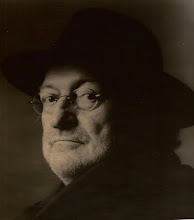






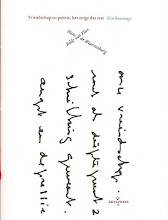
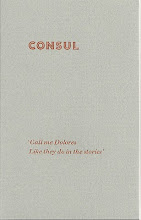
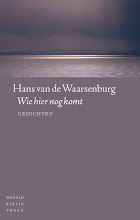.bmp)

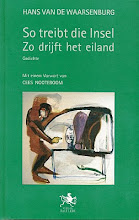
Geen opmerkingen:
Een reactie posten